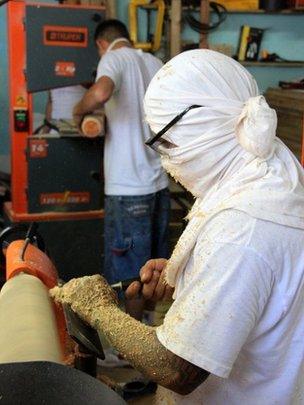Honduran gangs Salvatrucha and 18 Street announce truce
- Published
A gang member from Mara Salvatrucha tells reporters: "We come here for peace, we want to say sorry to society"
The two most notorious and violent street gangs in Honduras have promised to end the violence which has claimed tens of thousands of lives.
Mara Salvatrucha and Mara 18 Street said they would commit to zero crime and zero violence on the streets.
Honduras has one of the highest murder rates in the world.
Although no formal peace deal has been signed, the apparent ceasefire is thought to be the first step towards a more lasting agreement.
"Our truce is with God, with society and with the authorities," announced a spokesman for Mara Salvatrucha, identified only as Marco.
"We ask society and the authorities to forgive us for the damage we have done," he said at a news conference inside a prison in the Honduran city of San Pedro Sula.
A leader of the rival 18 Street gang - who did not want to be identified - offered the same promises, but only "if the government will listen," he added.
Government help
On Monday, the Honduran President Porfirio Lobo personally offered his support for the truce.
"We have to look for anything that's an alternative to violence," he told the Associated Press news agency.
"On the part of the government, we are open to any process that can lower violence."
The Roman Catholic Bishop Romulo Emiliani, who helped to broker the deal, said last week that the gangs needed government help to break away from their criminal activities, which included extorting money from businesses to finance their war.
He said the authorities should try to turn Honduras' prisons into rehabilitation centres.

The gangs say they need government help to earn an honest living and be reintegrated into society
His comments were echoed by gang leader Marco, who called on the government to support craft workshops so that they could work, earn a living and be reintegrated into society.
"I want my son to be a doctor or a cameraman, not a gangster," he said.
The BBC Central America Correspondent Will Grant says this is a significant step towards a full peace accord.
He adds that, in Honduras, hopes remain high that this latest plan could help tackle gang crime in the country.
LA gang culture
The deal follows a similar pact reached more than a year ago in neighbouring El Salvador.
The peace agreement there has roughly held together and, the authorities say, has contributed to a significant reduction in the murder rate and incidences of other violent crimes.
The Salvadorian government says homicides have dropped about 52%.
Mara Salvatrucha and Mara 18 Street have their roots in the 1980s in southern California.
They were created in Los Angeles and its suburbs by poor, mostly illegal, immigrants who had escaped civil wars in Central America.
When the conflicts ended there, many gang members were deported from the US, exporting LA's gang culture with them.
- Published19 May 2013
- Published28 September 2012
- Published10 October 2012